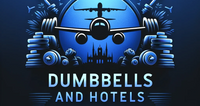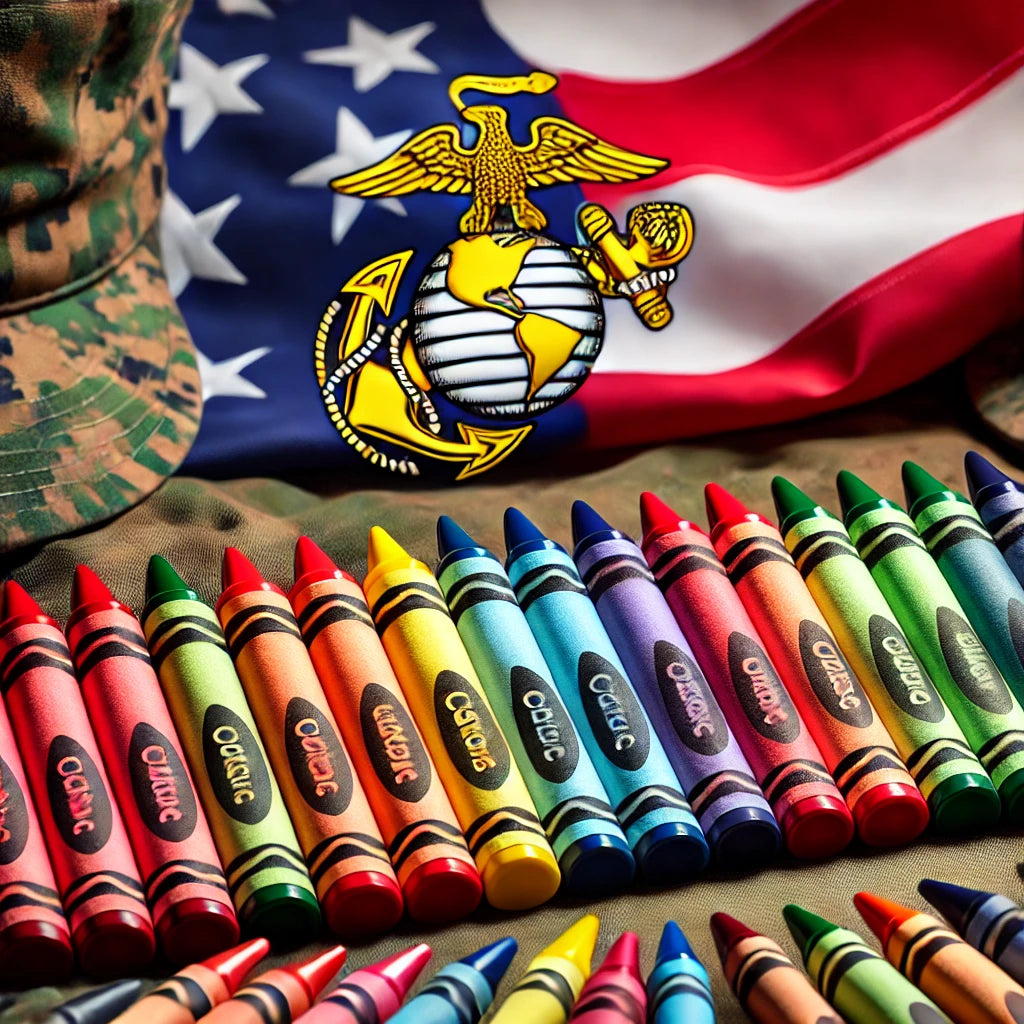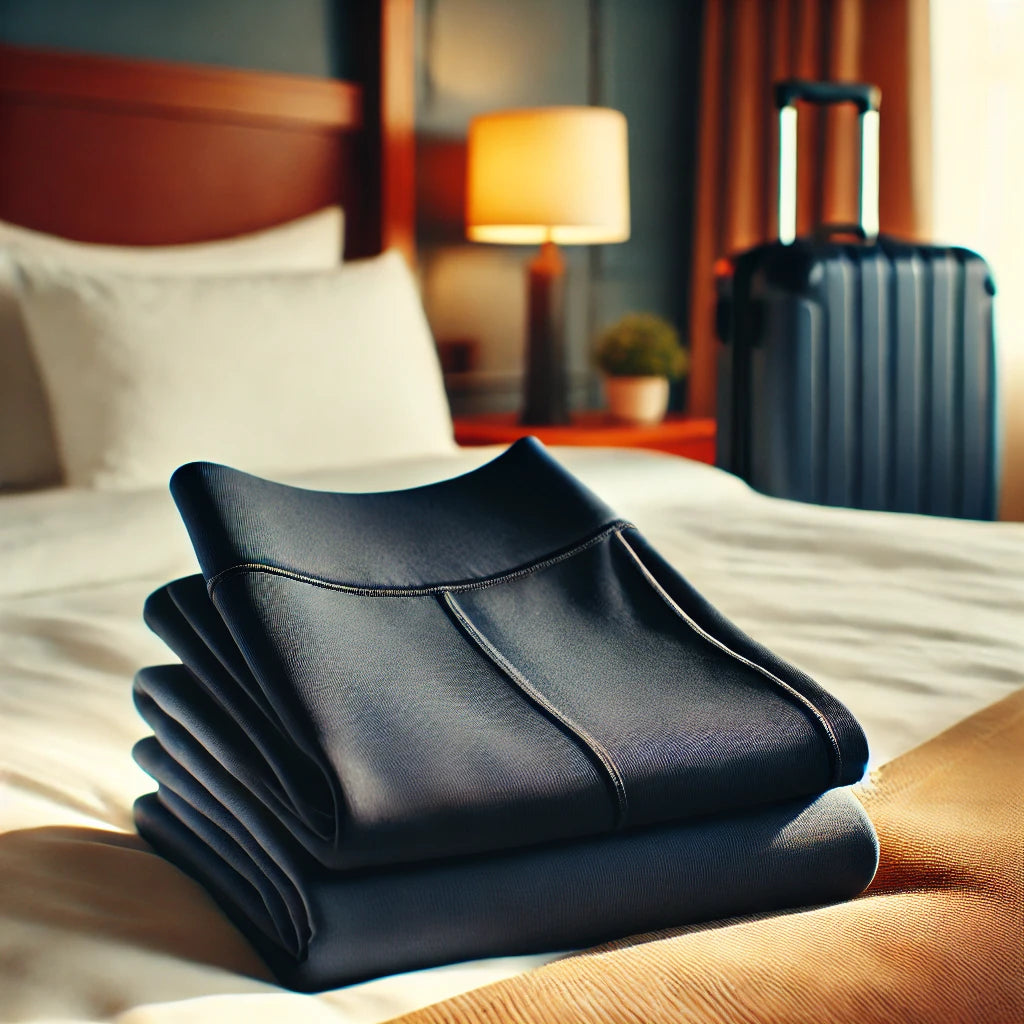The USMC crayons have become more than just a playful stereotype within the Marine Corps; they’ve evolved into a powerful symbol of Marine pride and camaraderie. What began as a light-hearted joke has transformed into a shared cultural reference that binds Marines together, honoring their unique, resilient spirit. For traveling Marines, pilots, and veterans alike, these crayons represent the humorous, yet tough-as-nails mentality that defines their brotherhood. In this post, we’ll explore how these colorful wax sticks have come to embody the strength, unity, and enduring pride of the United States Marine Corps.

The Origins of the USMC Crayon Joke
The crayon joke originated as part of a longstanding tradition of inter-branch military ribbing, where the Marines are often humorously portrayed as the most physically formidable but intellectually simple of the armed forces. Specifically, the joke about Marines eating crayons caught on after gaining traction in online forums, military memes, and social media platforms. This tongue-in-cheek humor pokes fun at the rugged, no-nonsense persona of Marines, casting them as individuals who don’t rely on intellectualism to get the job done but rather brute strength, resilience, and an unmatched will to win.
While some might view the joke as juvenile or disparaging, Marines embraced the crayon-eating stereotype as a badge of honor. It represents the Marine Corps’ ability to withstand good-natured teasing while staying laser-focused on their core mission—defending the nation. It’s a perfect reflection of their sense of humor, unshakable confidence, and readiness to turn even the most absurd jabs into a source of unity and pride.
The Brotherhood Behind the Symbol
For those unfamiliar with military culture, the idea of USMC crayons becoming a symbol of Marine pride may seem peculiar. However, this lighthearted symbol ties directly to the camaraderie and brotherhood that defines the Marine Corps. Marines are known for their close-knit bonds that often transcend typical friendships and become lifelong connections rooted in shared experiences, mutual respect, and a deep commitment to service.
Humor, especially self-deprecating humor, plays an integral role in fostering these relationships. Marines are no strangers to hardship—combat training, deployments, and the ever-present physical and mental challenges of their profession. Yet, they thrive by leaning on each other and finding laughter even in the toughest of times. In this context, the crayon joke embodies a deeper truth about Marines: they take pride in their toughness and ability to persevere, but they never take themselves too seriously.
Much like a pilot or travel nurse might share inside jokes about the difficulties of their profession, Marines share the crayon joke as a symbol of their shared experience and understanding. Whether on deployment or stationed at a distant base, they carry the crayon symbol as a reminder that they are part of something larger than themselves—a brotherhood that extends across generations of service.
Turning the Stereotype into a Source of Pride
What’s truly remarkable about the USMC crayon joke is how Marines have embraced it, turning what was once a playful dig into a source of pride. By reclaiming the joke, they have demonstrated their ability to laugh at themselves, which is a trait rooted in confidence, not insecurity. This transformation also highlights one of the key aspects of Marine culture: the power to own every aspect of their identity, whether it’s the ferocity of their training or the lightheartedness of an Internet meme.
For Marines, crayons now symbolize more than just a playful joke—they represent their resilient nature. In many ways, it mirrors the characteristics of the Corps itself: simple, tough, and built to endure any situation. Crayons, after all, don’t break easily, and neither do Marines.
The Commercialization of the Crayon Joke: From Meme to Merchandise
As the crayon joke continued to grow in popularity, it naturally became a marketing opportunity. Today, you can find a wide range of Marine-themed merchandise featuring crayons. From custom crayon packs with Marine insignias to shirts that proudly declare, "Marines: Tougher Than Crayons," the symbol has been widely embraced in both the Marine Corps community and beyond.
The rise of crayon-themed merchandise has also fueled a sense of shared identity among Marines and veterans. For traveling Marines, such as those who’ve transitioned to civilian roles like pilots or other careers, these items serve as a tangible reminder of their military roots. Crayon-themed gear is often worn with pride and sparks conversations, allowing former Marines to connect over shared experiences and, of course, the crayon joke that has become part of their collective narrative.
In this way, the crayon has transcended the digital world of memes and moved into real-life representations of Marine culture. These items are more than just novelties—they are cherished symbols of belonging to one of the most elite fighting forces in the world.
Crayons and the Marine Corps Ethos
At first glance, the connection between Marines and crayons may seem trivial. However, when you dig deeper into the core values of the Marine Corps—honor, courage, and commitment—it becomes clear that this lighthearted symbol actually represents much of what the Marines stand for.
First and foremost, the crayon symbolizes the Marine Corps' commitment to simplicity and effectiveness. Marines are trained to prioritize mission accomplishment above all else, often making do with whatever resources are at their disposal. Much like the humble crayon, they may not always have the flashiest tools, but they know how to get the job done with whatever they have. This resourcefulness is a key aspect of what makes Marines so formidable in battle.
The crayon also reflects the unwavering courage of the Marine Corps. Just as a crayon doesn’t easily bend or break, Marines are known for their unyielding bravery in the face of adversity. Whether it’s pushing through grueling training or facing down an enemy in combat, Marines demonstrate an unmatched level of courage that sets them apart from other branches of the military. The crayon’s simplicity is also symbolic of the Marine ethos—while their mission may seem straightforward, the challenges they face are anything but.
Finally, the crayon represents the Marine Corps' deep sense of honor and pride. Much like the Marines, crayons are dependable and long-lasting. While they might start small, they can leave a lasting impact. This reflects the lasting legacy that Marines strive to leave, both on and off the battlefield.

The Role of Humor in the Military
To fully appreciate the significance of the USMC crayon joke, it’s important to understand the role of humor in the military. For Marines, humor is more than just a way to pass the time; it’s a coping mechanism that helps them deal with the rigors of military life, including deployments, separation from loved ones, and the stresses of combat.
Humor helps build resilience, allowing Marines to find light even in the darkest of times. Whether they’re cracking jokes during a long deployment or poking fun at each other during training, Marines rely on humor to maintain morale and strengthen their bond with one another.
The crayon joke, in particular, exemplifies the type of humor that flourishes within the Marine Corps. It’s self-deprecating yet full of pride, and it allows Marines to laugh at themselves without losing sight of their professionalism or sense of duty. For traveling Marines—whether on deployment, training, or in civilian roles such as pilots—this shared sense of humor becomes an important connection point, helping them find common ground with fellow service members no matter where they are in the world.
How Veterans and Civilians Have Adopted the Crayon Symbol
The impact of the crayon joke isn’t limited to active-duty Marines. Veterans and civilians alike have adopted the symbol as a way of honoring the Marine Corps and its unique culture. Many veterans, especially those who’ve transitioned to civilian roles in aviation, healthcare, or other professions, proudly display crayon-themed merchandise as a nod to their service.
For civilian supporters, the crayon joke offers a lighthearted way to express their appreciation for the Marines. Crayon-themed gifts, shirts, and even custom-made crayons have become popular items at Marine Corps events, fundraisers, and reunions, allowing supporters to join in on the joke and show their solidarity with the Marine Corps community.
In recent years, some businesses and nonprofits have even used the crayon symbol to raise awareness for veterans' issues, particularly in the realms of mental health and veteran employment. By using the crayon as a playful yet recognizable symbol, these organizations have been able to engage the public in conversations about the challenges that many Marines face after leaving the service.
The Role of Humor in Building Resilience
For Marines, humor has long been a crucial tool in developing mental toughness and building resilience. It's no secret that military life comes with intense physical, emotional, and psychological demands. From the rigors of basic training to the high-stress environments of combat, Marines endure challenges that test their limits. Yet, it’s often said that laughter is the best medicine, and for Marines, humor provides a way to lighten even the darkest of situations.
The crayon joke, like many other humorous traditions in the military, gives Marines an outlet to cope with stress. In fact, military psychologists have long studied how humor plays a role in maintaining morale and building mental fortitude during periods of high tension. By joking about themselves and their perceived traits—such as the stereotype that Marines are strong but not necessarily the most academically inclined—Marines are able to diffuse tension, remain focused on their mission, and foster stronger bonds within their unit.
This type of humor is not unique to the Marines, but the way in which they embrace it is special. Marines are known for their gritty determination and unrelenting sense of duty, but this toughness is balanced by an ability to laugh at themselves. The crayon joke, in particular, represents how Marines take pride in their reputation for being hard-hitting, mission-driven, and focused on action over analysis.
For traveling Marines, who are often away from their families for extended periods of time, these moments of levity are even more important. Whether they’re stationed at a remote base or flying between assignments, humor helps them stay connected to their fellow Marines and to their shared identity. It's a reminder that, no matter how far they are from home, they are still part of the same brotherhood, united by common experiences and a shared sense of humor.
The Crayon’s Evolution: From Stereotype to Badge of Honor
The ability of Marines to take the crayon joke and turn it into a symbol of pride is a testament to their strength of character and adaptability. What began as a stereotype about Marines being "simple" has been redefined by the Marines themselves, who now wear the joke as a badge of honor.
This ability to reclaim a stereotype and reshape it into something positive is a unique facet of Marine culture. It reflects the Corps' larger philosophy of turning challenges into opportunities, a mindset that is instilled in every Marine from the moment they step into basic training. Marines are trained to adapt to changing circumstances, to take the difficult road when necessary, and to find strength in adversity. The crayon joke is just one example of how this mentality manifests in their everyday lives.
For example, in boot camp and throughout training, Marines are taught that the mental challenges they face are just as important as the physical ones. Recruits are put through grueling exercises not just to strengthen their bodies but also to develop mental toughness. They’re trained to remain calm and composed under pressure, to push through discomfort, and to work as a cohesive unit even when situations seem overwhelming.
In much the same way, Marines have taken the crayon stereotype and turned it into something that reflects their resilience. By owning the joke, they’ve demonstrated their ability to withstand criticism, to laugh at themselves, and to stay focused on what really matters: their mission and their fellow Marines.
This mindset also extends to Marines who have transitioned into civilian roles. Whether they’ve become pilots, healthcare professionals, or entrepreneurs, Marines carry with them the lessons they learned in the Corps: adaptability, perseverance, and an unshakable sense of pride in their service. The crayon symbol is often displayed proudly, not just as a humorous reference but as a reminder of the unique experiences and bonds they’ve shared with their fellow Marines.
Crayon-Themed Fundraisers and Veteran Support Initiatives
As the crayon symbol has grown in popularity, it has also become a focal point for fundraising efforts and initiatives designed to support veterans. Organizations and veteran-owned businesses have embraced the crayon as a way to connect with both active-duty Marines and veterans, using the lighthearted symbol to raise awareness and funds for causes that matter to the Marine Corps community.
For example, many veteran-owned businesses have created crayon-themed products, with proceeds going to support initiatives such as mental health programs, veteran job training, and transition assistance. These products range from T-shirts and hats to custom-made crayons in the colors of the Marine Corps. By purchasing these items, civilians and veterans alike are able to show their support for the Marine Corps and contribute to causes that help veterans reintegrate into civilian life.
One notable example is the use of crayon-themed fundraisers to support organizations that provide mental health services to veterans. As many Marines transition out of active duty, they face a host of challenges, including PTSD, depression, and anxiety. The crayon joke, while lighthearted, has been used as a tool to engage the public in important conversations about these issues. By turning a humorous symbol into a means of raising awareness, organizations are able to reach a broader audience and destigmatize the conversation around mental health in the veteran community.
In addition to supporting mental health initiatives, crayon-themed products have also been used to fund scholarships for veterans and their families, as well as programs that provide employment training and support for transitioning service members. For traveling professionals who were once Marines, such as airline pilots or travel nurses, these programs are especially valuable as they provide the skills and resources needed to build successful civilian careers.
Crayons as a Bridge Between Marines and Civilian Communities
While the crayon joke is most deeply rooted in Marine Corps culture, it has also served as a bridge between Marines and the broader civilian population. Civilians who may not be familiar with the intricacies of military life are often introduced to the Marine Corps through humorous symbols like the crayon, which offer a more accessible and relatable entry point to understanding military culture.
This connection is especially important for building relationships between veterans and civilians, as it fosters greater understanding and appreciation of the sacrifices made by service members. In many cases, civilians who purchase crayon-themed merchandise or participate in crayon-related fundraisers are doing so not just because they find the joke amusing, but because they want to show their support for the Marine Corps and the larger military community.
By embracing the crayon as a symbol of pride, Marines have made it easier for civilians to connect with them on a personal level. The crayon represents not only the toughness and resilience of Marines but also their sense of humor and humility. For civilians who may not fully understand the challenges faced by service members, this lighthearted symbol serves as a way to open the door to more meaningful conversations about the realities of military life and the importance of supporting veterans.
Moreover, for civilians working alongside former Marines—whether in aviation, healthcare, or other industries—the crayon joke can be a fun way to bond and build rapport. It serves as a lighthearted reminder of the Marine’s service, offering civilians a way to engage with veterans in a positive and respectful manner.

The Crayon and Military Traditions
Military traditions are an essential part of the culture within all branches of the armed forces, but the Marine Corps is especially known for its strong sense of history and tradition. From the uniforms Marines wear to the rituals they observe during key events, every aspect of Marine Corps life is steeped in a deep respect for those who came before them. The crayon symbol, while modern in origin, has found its place among these traditions as a unique expression of the Marine Corps' enduring sense of pride and camaraderie.
One reason the crayon has resonated so deeply within Marine Corps culture is that it aligns with the Corps’ values of humility and resilience. Marines are taught to remain humble in their achievements, even as they accomplish some of the most difficult and dangerous missions in the world. This humility is reflected in their willingness to embrace the crayon joke, turning what could have been a source of ridicule into a point of pride.
Moreover, the crayon symbol has become part of the informal rituals that Marines observe during reunions and gatherings. Whether they’re sharing a laugh over old jokes or gifting each other crayon-themed memorabilia, Marines use the crayon as a way to reconnect with one another and honor the bonds they forged during their time in service.
This tradition has extended to Marine Corps celebrations, such as the annual Marine Corps Ball, where crayon-themed gifts and decorations are often incorporated into the festivities. These events serve as a reminder of the lighter side of Marine life, offering Marines a chance to celebrate their service while also reflecting on the humor that helped them through the tough times.
The Crayon as a Symbol of Inclusivity and Brotherhood
At its core, the crayon symbolizes the inclusivity and brotherhood that defines the Marine Corps. Regardless of rank, background, or military occupational specialty (MOS), every Marine is bound by a shared sense of duty and pride in their service. The crayon joke is embraced by all Marines, from the newest recruit to the most seasoned veteran, because it speaks to a universal truth about the Marine experience: that no matter where they serve or what they do, they are all part of the same family.
This sense of inclusivity is especially important for Marines who have transitioned into civilian roles. For traveling professionals, such as pilots or healthcare workers, the crayon symbol serves as a reminder that they are still connected to the Marine Corps community, no matter where life takes them. Whether they’re flying across the country or working in a hospital, they carry with them the lessons they learned in the Corps, along with the camaraderie and humor that have defined their service.
In this way, the crayon represents more than just a joke—it is a symbol of the enduring brotherhood that unites all Marines. Whether they’re stationed at a remote outpost or traveling the world in civilian professions, Marines remain connected through their shared experiences, their sense of pride, and their ability to laugh at themselves.
The Crayon as a Symbol of Perseverance and Simplicity
One of the reasons the crayon joke resonates so deeply with the Marine Corps is that it aligns with the fundamental values of simplicity and perseverance. The Marine Corps prides itself on being the leanest and most efficient branch of the U.S. military, capable of accomplishing missions with minimal resources and maximum impact. Marines are trained to make do with whatever they have, no matter how challenging the circumstances, and to persevere through adversity with grit and determination.
This mindset is reflected in the crayon stereotype. While crayons are simple, unassuming objects, they serve as a perfect metaphor for the Marine Corps' approach to problem-solving: straightforward, durable, and effective. Marines are not known for over-complicating things—they take action, adapt on the fly, and complete their mission with whatever tools are available. The crayon joke captures this essence, poking fun at the idea that Marines are rough around the edges but always get the job done.
In the same way that a crayon is a basic tool with a clear purpose, the Marine Corps operates with clarity of mission and purpose. The crayon, while a humorous symbol, represents the idea that simplicity often wins the day. Whether Marines are navigating complex combat operations or adjusting to civilian life as traveling professionals, their training has taught them to rely on the basics—discipline, teamwork, and resilience.
This sense of perseverance also connects the crayon joke to the broader narrative of Marine toughness. Marines are often seen as the "first to fight," ready to deploy at a moment's notice and face danger head-on. Their reputation for being some of the toughest, most resilient warriors in the U.S. military is something they wear with pride, and the crayon joke is a playful nod to this aspect of their identity. It acknowledges their physical toughness but also celebrates their mental fortitude—their ability to laugh at themselves and keep going no matter what challenges arise.
How Social Media Amplified the Crayon Symbol
The rise of social media has played a significant role in transforming the crayon joke from a niche military in-joke to a widely recognized symbol of Marine pride. Platforms like Facebook, Instagram, and Twitter have allowed Marines and veterans to share memes, stories, and jokes that resonate within their community, creating a shared language of humor that strengthens the bonds between service members.
Memes, in particular, have been a driving force behind the crayon joke's popularity. Memes are a form of digital shorthand, allowing people to communicate complex ideas or emotions through humor. For Marines, memes about eating crayons have become a way to express their unique sense of identity, poking fun at the stereotypes that surround their branch while also reinforcing the camaraderie that comes with being a Marine.
Marine Corps social media pages, veteran groups, and meme accounts dedicated to military humor have all contributed to the spread of the crayon joke. What began as a simple punchline has been amplified by the collective voice of Marines and veterans, turning it into a shared symbol of pride. Today, it's not uncommon to see Marines posting photos of themselves with crayon-themed gear, commenting on crayon-related posts, or using the joke to connect with others in the military community.
For traveling Marines, social media has become an especially important tool for staying connected to their brothers and sisters in arms. Whether they’re stationed overseas or transitioning into civilian life, social media allows them to maintain their connection to the Marine Corps and its unique culture. The crayon joke serves as a touchstone for these connections, reminding Marines that no matter where they are in the world, they’re part of a larger, supportive community.
Veteran-owned businesses have also used social media to capitalize on the crayon symbol, offering crayon-themed products and promoting them to Marines and their supporters online. This has created a marketplace for Marine-specific humor, with crayon-themed shirts, mugs, and even edible crayons becoming popular items among both active-duty Marines and veterans.

Crayons in Marine Corps Art: Creativity in the Ranks
While the crayon joke started as a humorous stereotype, it has also found its way into the creative side of Marine Corps culture. Marines, known for their adaptability, have turned the crayon into an artistic medium. In fact, some Marines and veterans have taken the crayon joke literally, creating works of art using actual crayons to showcase their creative talents and further embrace the stereotype.
This unexpected artistic movement reflects the versatility and creativity that Marines bring to all aspects of their lives. Even in the face of a stereotype, Marines find ways to subvert expectations and turn the joke into something more meaningful. Whether they’re drawing Marine Corps emblems, portraits of their fellow service members, or patriotic scenes, these crayon artists demonstrate the wide range of talents that exist within the Marine Corps.
Crayon art has become a popular feature at Marine Corps events and fundraisers, with Marines showcasing their creations as a way to bond over the shared humor of the crayon joke while also highlighting their artistic abilities. In many cases, these pieces are auctioned off, with proceeds going to support veterans’ charities and causes such as mental health services, housing assistance, and job training programs for former Marines.
This artistic expression serves as yet another example of how Marines have taken control of the crayon symbol and redefined it on their own terms. What began as a joke about Marines eating crayons has evolved into a celebration of their creativity, resilience, and ability to find humor in any situation. For Marines, the crayon is not just a punchline—it’s a tool for self-expression and a way to connect with their community.
Crayons and Mental Health: A Surprising Connection
One surprising development related to the crayon symbol is its connection to mental health initiatives for Marines and veterans. Mental health is a critical issue within the military community, with many service members struggling with the effects of PTSD, depression, and anxiety as a result of their experiences in combat or the challenges of transitioning back to civilian life.
Some organizations have started using the crayon symbol as part of their mental health outreach efforts, recognizing that humor can be a powerful tool for starting difficult conversations. By using a lighthearted symbol like the crayon, these organizations are able to engage Marines and veterans in discussions about mental health in a way that feels approachable and non-threatening.
For example, some mental health programs have created coloring books for veterans, featuring Marine-themed illustrations and, of course, plenty of crayons. These coloring books serve as a form of art therapy, allowing veterans to express themselves creatively while also providing a calming activity that can help reduce stress and anxiety. The crayon, once a symbol of humor, has become a tool for healing and self-care.
In addition to coloring books, some veteran support groups have started using crayon-themed merchandise to promote mental health awareness. Shirts, hats, and stickers featuring the crayon symbol are sold with proceeds going to support mental health services for Marines and veterans. These items not only raise funds but also help reduce the stigma around seeking mental health support, reminding Marines that it’s okay to ask for help when they need it.
This connection between crayons and mental health highlights the versatility of the crayon symbol. What started as a joke has taken on a new level of significance, serving as a bridge between humor and healing. For Marines, the crayon is a reminder that they are not alone—that they can find support, strength, and resilience in both their community and the resources available to them.
The Legacy of the Crayon Joke: How It Will Continue to Shape Marine Corps Culture
As the crayon joke continues to evolve, it’s clear that its impact on Marine Corps culture will be long-lasting. What began as a playful jab has become a powerful symbol of pride, resilience, and camaraderie, woven into the fabric of Marine life. For current Marines, veterans, and even civilians, the crayon serves as a reminder of the unique bond that unites all who have worn the Marine Corps uniform.
The legacy of the crayon joke will likely continue to grow as new generations of Marines embrace the symbol and make it their own. As technology advances and Marines find new ways to connect with each other through social media, online communities, and virtual events, the crayon will remain a touchstone of Marine humor and identity. It’s a joke that transcends time and place, allowing Marines to find common ground with each other no matter where they are in the world.
For veterans, the crayon joke will continue to play a role in maintaining their connection to the Marine Corps community. Whether they’re transitioning into civilian careers, traveling the world as pilots, or pursuing new opportunities in healthcare or business, veterans will always carry with them the lessons they learned in the Corps. The crayon symbol will serve as a reminder of their shared experiences, their perseverance, and their ability to laugh in the face of adversity.
Moreover, the crayon’s influence on Marine Corps culture may extend beyond humor and into more formal aspects of Marine life. As the symbol becomes more ingrained in Marine traditions, it’s possible that the crayon will be incorporated into official events, ceremonies, and even training programs. Just as the Marines have rituals that honor their history and traditions, the crayon could become a symbol that future Marines look to as a source of inspiration and pride.
Finally, the crayon symbol will continue to serve as a bridge between the Marine Corps and the civilian world. For civilians who may not fully understand the challenges of military life, the crayon offers a way to engage with the Marine community and show their support. Whether through crayon-themed fundraisers, art projects, or mental health initiatives, civilians will have the opportunity to connect with Marines and veterans in a meaningful way.

Crayons and the Future of Marine Corps Culture
As the crayon joke continues to gain momentum, it’s clear that this unlikely symbol will remain a part of Marine Corps culture for years to come. Whether it’s through memes, merchandise, or inside jokes shared among service members, the crayon has taken on a life of its own, becoming a lighthearted yet meaningful representation of the Marine ethos.
For Marines, veterans, and their supporters, the crayon serves as a reminder of the toughness, humor, and resilience that define the Marine Corps. It’s a symbol that brings them together, no matter where they are in the world, and it will continue to serve as a source of pride and camaraderie for generations to come.
In conclusion, the USMC crayon has become far more than just a humorous stereotype—it’s a powerful symbol of Marine pride, unity, and resilience. Whether they’re active-duty Marines, traveling veterans, or civilians who support the Corps, the crayon represents the strength, humor, and enduring spirit of one of the most elite fighting forces in the world.
Read More
- USMC Crayons: The Colorful Tradition Every Marine Should Know
- From Battlefield to Crayon Box: The Story Behind USMC Crayons
- USMC Crayons Explained: A Fun Look at Marine Corps Culture
- USMC Crayons: How a Joke Turned into Marine Corps Memorabilia
- The History of USMC Crayons: From Myth to Marine Reality
- USMC Crayons: Understanding the Inside Joke Among Marines







